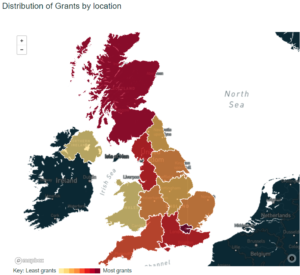Geography consultation
Proposed changes to the 360Giving Data Standard as a result of the Working Group on Geography
Over the last six months, 360Giving has been exploring issues related to location data, a topic of importance for funders and users of grants data alike. We published our report on the Geography Working Group at the end of March 2022, which you can read here.
This consultation sets out the details of a proposed update to the 360Giving Data Standard arising from the discussions shared in the Geography Working Group. Here we have outlined implications of those changes and are seeking feedback from our stakeholders and users of 360Giving data via our survey (which should take no longer than ten minutes). The deadline is at 5pm on Friday 6th May.

Location scope field
We are proposing a new field Beneficiary Location:Scope and codelist which will allow funders to categorise their grants by the geographical scope of their intended impact. This is intended to be a voluntary option in addition to options already available to funders in the 360Giving Data Standard such as using postcodes or other geographical codes to describe specific locations. You can read our full publisher ‘Guide to Location Data’ here.
Why is this new field being proposed?
The location scope field allows funders to provide useful information about the location of grants, even when they have no specific geographic data.
Currently in published 360Giving data, it is not possible to distinguish between grants that have no location information. This could be because the funder does not have this data available to publish, because it included a number of different locations, because they have opted not to share the data, or because location is not relevant to the grant. It is hoped that this new field and codelist will help to reduce the ambiguity of location information, allowing funders to provide more useful context about their grants, so that users can use and analyse the data more accurately.
The codelist allows funders to indicate, for example, if a grant is global, national or local in the scope of its impact. In addition, the codelist includes ‘Location undefined’ which allows funders to indicate when location is not relevant to the funding.
The field may be useful to funders who publish recipient location but do not publish any beneficiary location, or those who do not currently include any location information in their 360Giving data.
Impact on existing publishers and users of the 360Giving Data Standard
The proposed change would introduce a new optional field to the 360Giving Data Standard, which means it is a backwards compatible change, known as a MINOR update. You can read about the governance and revision control process for the Standard here.
When can we expect to see this change rolled out?
Subject to a successful consultation and governance review, we expect to be able to implement this new field in the Standard by summer 2022.
We’d love to hear from you about whether this field would be useful – have your say by completing our consultation form below. And please do share this consultation with any person or organisation which is interested in understanding open data on grants location better.
Clarifying the use of ‘beneficiary location’ fields being used
The 360Giving Data Standard uses the term beneficiary location to describe where the impact of a grant is being directed, and in distinction to the recipient location. However, we know that a wide range of types of location data are being shared using these fields. As well as the location of the ‘people who benefit’ from the funding, it can also be used to describe an organisation’s area of operation, the location of a building or green space, or where an activity is being delivered.
We are seeking to identify the types of location data funders collect that are currently or could be shared using the beneficiary location fields. With further information about the range of location types in use, we can then explore how this part of the Standard can be improved.
Please note: “Beneficiary” is a term used in this consultation because it references the field name created in the original 360Giving Data Standard. We recognise that it is not an ideal term and it is being used in the context and limitations of existing structures. We are reviewing our longer term options to change this language in the 360Giving Data Standard.
Have your say
Complete our survey here 360Giving Consultation Survey – Geography
